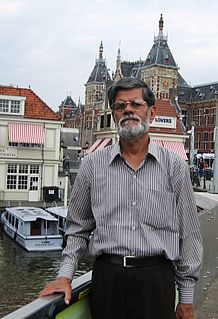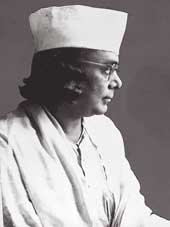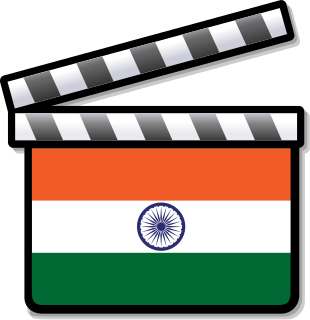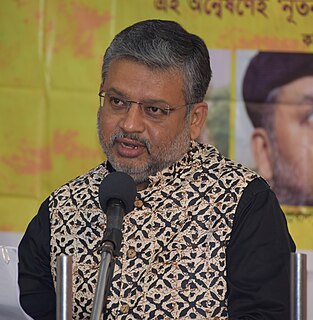Poetry film is a subgenre of film that fuses the use of spoken word poetry, visual images, and sound to create a stronger presentation and interpretation of the meaning being conveyed. This fusion of image and spoken word (both independent and interdependent) creates what William Wees called the "Poetry-film" genre. He suggested that "a number of avant-garde film and video makers have created a synthesis of poetry and film that generates associations, connotations and metaphors neither the verbal nor the visual text would produce on its own". [1]
This genre of film was first explored in the 1920s by Impressionists Germaine Dulac, Louis Delluc, Man Ray, Hans Richter, and others. In the mid-1960s and early 1970s this genre was further explored by the Beat Generation poets Lawrence Ferlinghetti, Allen Ginsberg, and Herman Berlandt, and developed into a festival held annually at the Fort Mason Center in California.
Poetry film is characterized by its nonlinear narrative style of editing, and flow of images and spoken words (stream of consciousness), although linear narration and editing have been used to good effect in the creation of some poetry films (see Narrative). Generally, poetry film is created as a noncommercial production, but some attempts have been made to produce commercial films. Some poetry films have been used as instructional aids in classes to illustrate concepts such as allusion, simile, and metaphor.
In 1981, a group in Tennessee experimented with fusing spoken word, images, and sound into what was called "poetry videos". The concept was to create poetry videos, similar to videos which were gaining popularity at the time, making poetry more acceptable as a commercial product. One video was produced with the assistance of the Tennessee State communications department but was never commercially released.
One of the most famous poetry films ever produced was aired on the Smothers Brothers Show in 1968. The film was by Lawrence Ferlinghetti and was titled the "Assassination Raga". The film fused images of death, slow sitar, and Ferlinghetti's spoken word poem about the assassination of the Kennedys.
More recently George Aguilar has developed a TV series of poetry films called Eyestruck. Performance Hedwig Gorski was one of the first to successfully produce and direct her video poem using state arts funding. [2] She received an Artist's Fellowship in 2002 for work fusing poetry and media. [3]
Beginning in the 21st century the genre of poetry films making also reached other parts of the world including India. Several traditional television professionals experimented with the . In 2007 a non-profit organisation, Sadho, created an exclusive platform for screening of poetry films in India. The Sadho Poetry Film Festival is a biennial international film festival in New Delhi. The first Sadho Poetry Film Festival was organised in the year 2007.
Poetry film-makers
Utpal Datta (Assam), Vishwajyoti Ghosh, Sidharth Pratap Singh, Parijat Kaul, Anjali Monteiro & K.P Jayasankar (Centre for Media and Cultural Studies), Nandan Saxena & Kavita Bahl, are some the poetry filmmakers from India. The list of -poetry filmmakers also includes Sidharth Saxena and Shashwat Mudgal from India and Tahira Rana from the UK. Utpal Datta had made his first Poetry Film 'BOHUBRITTA' based on a poem by Swapna Dutta Deka, the cinematography is by Nagen Baishya, Editing by Aseem Sinha (he has edited several important films by Shyam Benegal), and Sound designing by Amrit Pritam. The film was premiered at Guwahati International Documentary Short and Animation Film Festival. This film has been selected to Indian Panorama of International Film Festival of India, 2019, and later screened at several International Film Festivals. Shuvayu Bhattacharjee has made a poetry film titled KOLKATA COCKTAILS based on nine poems of these three poets Ipsita Ganguli, Lopa Banerjee, and Gopa Bhattacharjee. In the film, these three poets acted as childhood friends and rediscover their souls in Kolkata. The film has been critically acclaimed all around. It has been screened at many international film festivals like Silent Film Festival, Nextgen International Film Festival, etc, and also received the BEst Woman Film Award inLiteroma Short Film Contest and Carnival. Mrigankasekhar Ganguly, at his 22, made the first poetry film in Bengali 'megh bolechhe' which was screened at Kolkata press club. [4] In 2011 he directed his second poetry film 'Iti Apu' recited by Soumitra Chatterjee. [5] In 2014, he directed Stark Electric Jesus based on the poem written by Malay Roy Choudhury. It breaks the narrative structure and creates a language of poetry in film.
Iranian director Abbas Kiarostami, is one of the most famous poetry filmmakers, who has received acclaim for his poetry films.

Bengali music comprises a long tradition of religious and secular song-writing over a period of almost a millennium. Composed with lyrics in the Bengali language, Bengali music spans a wide variety of styles.

Jibanananda Das was a Bengali poet, writer, novelist and essayist in the Bengali language. Popularly called "Rupashi Banglar Kabi'', Das is the most read poet after Rabindranath Tagore and Kazi Nazrul Islam in Bangladesh and West Bengal. While not particularly well recognised during his lifetime, today Das is acknowledged as one of the greatest poets in the Bengali language.

SoumitraChatterjee was an Indian film actor, director, playwright, writer, singer and poet. He is regarded as one of the greatest and most influential actors in the history of Indian Bengali cinema. He is best known for his collaborations with director Satyajit Ray, with whom he worked in fourteen films.
The Hungry Generation was a literary movement in the Bengali language launched by what is known today as the Hungryalist quartet, i.e. Shakti Chattopadhyay,, Malay Roy Choudhury, Samir Roychoudhury and Debi Roy, during the 1960s in Kolkata, India. Due to their involvement in this avant garde cultural movement, the leaders lost their jobs and were jailed by the incumbent government. They challenged contemporary ideas about literature and contributed significantly to the evolution of the language and idiom used by contemporaneous artists to express their feelings in literature and painting.

Salil Chowdhury was an Indian songwriter, music director, lyricist, writer, and poet who predominantly composed for Bengali, Hindi, and Malayalam films. He composed music for films in 13 languages. This includes over 75 Hindi films, 41 Bengali films, around 27 Malayalam films, and a few Marathi, Tamil, Telugu, Kannada, Gujarati, Odia and Assamese films. His musical ability was widely recognised and acknowledged in the Indian film industry. He was an accomplished composer and arranger who was proficient in several musical instruments, including flute, the piano, and the esraj. He was also widely acclaimed and admired for his inspirational and original poetry in Bengali.

Malay Roy Choudhury is an Indian Bengali poet, playwright, short story writer, essayist and novelist who founded the Hungryalist movement in the 1960s.

Paschimbanga Bangla Akademi is the official regulatory body of the Bengali language in West Bengal, India. Modeled after Bangla Academy of Bangladesh and France's Académie française, the Bangla Akademi was founded on 20 May 1986 in Kolkata to act as the official authority of the language and is entrusted with the responsibility of reforming Bengali spelling and grammar, compiling dictionaries, encyclopedias and terminologies and promoting Bengali language and culture in West Bengal. Though the Akademi has no enforcement power over their rules and regulations, yet they are widely accepted by the Governments of West Bengal and Tripura as well as a considerable number of private publishing houses and institutions like the Oxford University Press and the Ramakrishna Mission.

Bengali literature denotes the body of writings in the Bengali language. Bengali has developed over the course of roughly 1,300 years. The earliest extant work in Bengali literature is the Charyapada, a collection of Buddhist mystic songs in Old Bengali dating back to the 10th and 11th centuries. The timeline of Bengali literature is divided into three periods: ancient (650-1200), medieval (1200-1800) and modern. Medieval Bengali literature consists of various poetic genres, including Hindu religious scriptures, Islamic epics, Vaishnava texts, translations of Arabic, Persian and Sanskrit texts, and secular texts by Muslim poets. Novels were introduced in the mid-19th century. Nobel Laureate Rabindranath Tagore is the best known figure of Bengali literature to the world. Kazi Nazrul Islam, notable for his activism and anti-British literature, was described as the Rebel Poet and is now recognised as the National poet of Bangladesh.
Video poetry is poetry in video form. It is also known as videopoetry, video-visual poetry, poetronica, poetry video, media poetry, or Cin(E)-Poetry depending on the length and content of the video work and the techniques employed in its creation.
Subimal Basak, is an Indian fiction writer. He is a member of the Hungry generation, with Samir Roychoudhury, Falguni Roy, Shakti Chattopadhyay and the movement's creator Malay Roy Choudhury.

Ipsita Roy Chakraverti is a Wiccan priestess based in India. Born into an elite family in India with a diplomat for a father and royalty for mother, Chakraverti spent her early years in Canada and the US where her father was stationed. There, she was allowed to join a select group of women studying ancient cultures of the world and the old ways. Chakraverti studied with them for three years and finally chose Wicca as her religion. After coming back to India and getting married, Chakraverti declared herself as a witch in 1986. Amidst the backlash that followed her declaration, Chakraverti explained to the media the Neo Pagan ways of Wicca and its healing power.

Bengali cinema, also known as Tollywood, refers to the Indian Bengali language film industry based in the Tollygunge region of Kolkata, West Bengal, India. The origins of the nickname Toollywood, a portmanteau of the words Tollygunge and Hollywood, dates back to 1932. It was a historically important film industry, at one time the centre of Indian film production. The Bengali film industry is known for producing many of Indian cinema's most critically acclaimed global Parallel Cinema and art films, with several of its filmmakers gaining prominence at the Indian National Film Awards as well as international acclaim.

Bengali, also known by its endonym Bangla, is an Indo-Aryan language native to the Bengal region of South Asia. It is the official, national, and most widely spoken language of Bangladesh and the second most widely spoken of the 22 scheduled languages of India. With approximately 300 million native speakers and another 37 million as second language speakers, Bengali is the fifth most-spoken native language and the sixth most spoken language by total number of speakers in the world.

Anupam Roy is an Indian singer, lyricist, composer and playback singer from Kolkata, West Bengal. He made his debut with Amake Amar Moto Thakte Dao & Benche Thakar Gaan, which appeared on the soundtrack of the 2010 Bengali film Autograph. Since then, he has gone on to compose, write lyrics and sing for many Bengali films. In 2015, he made his Bollywood debut, composing the songs and score for Piku. He was nominated for the 61st Filmfare Award for Best Music Director, and won the 61st Filmfare Award for Best Background Score for Piku. He is a recipient of 64th National Film Award for Best Lyrics for the song Tumi Jaake Bhalobasho.

Baishey Srabon is a 2011 Indian Bengali Film Noir psychological thriller film directed by Srijit Mukherji. it was his second film. The cast consists of Prosenjit Chatterjee, Parambrata Chatterjee, Raima Sen, Abir Chatterjee and director Gautam Ghose, making a comeback after a 29-year absence. The film centers on two journalists and two police officers chasing a vengeful psychopath, who leaves behind couplets from Bengali poems. Baishe Srabon received positive reviews from critics, and was one of the highest-grossing Bengali films of 2011. The film received an A certificate from the Central Board of Film Certification for explicit violence and adult language. This film brought back the Thriller genre to Bengali Cinema after a long time. The core plot of the movie is loosely based on the 1995 crime-thriller Seven and 2008 drama-thriller Righteous Kill. A sequel of the film was released on 23 January 2020, titled Dwitiyo Purush directed by Srijit Mukherji with Parambrata Chattopadhyay, Abir Chatterjee and Raima Sen reprising their roles.
Sibaji Bandyopadhyay is an Indian author, critic, academic, theorist and performer, who writes in Bengali and English. His interests lie in the fields of Bengali and English literature, literary theory, philosophy, feminism, sexuality, cinema and psychoanalysis.
Maa...Tomay Chara Ghum Asena, also called Maa, was a Bengali television serial telecast by Star Jalsha. It was produced by Shree Venkatesh Films. The show narrated the bond between mother and daughter. It is one of the longest-running Bengali television series and Star Jalsha's longest-running serial.

Stark Electric Jesus is a 2014 short film inspired by the poem Prochondo Boidyutik Chhutar or Stark Electric Jesus written by Malay Roy Choudhury. The film has won the official selection as the only Indian film at the Trinidad and Tobago Film Festivalin New Media section and has been selected for screening at Leeds Independent Film Festival. The film also won 27 official selection in 20 different countries and also won 'Best Video Art' from Poland, 'Most Promising Artist' Award from Madatac, 06, Spain and 'Best Fantasy Film' award from Hrizantema International Horror and Fantasy Film Festival, Serbia.

Bengal is a region in South Asia, politically split between Bangladesh and India. Due to its long history and complicated political divisions, various names have been used to refer to the region and its subsections. The modern English name Bengal is an exonym derived from the Bengal Sultanate period. The name is used by both Bangladesh and West Bengal in international contexts. In the Bengali language, the two Bengals each use a different term to refer to the nominally identified nation: Bānglā and Baṅga

Prabal Kumar Basu is an Indian poet, essayist and editor. He writes in his mother tongue Bengali.













